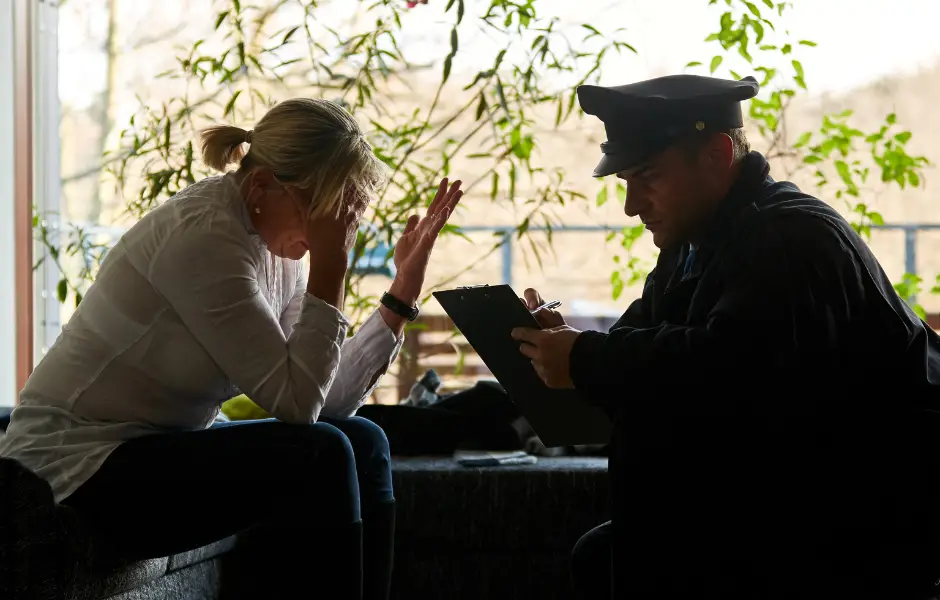Are you ever driving down the highway and someone comes past you speeding? Or maybe you see someone shoplifting at a store and they just casually walk out without paying? In many cases, these types of crimes go unreported or unnoticed. However, is it actually illegal not to report a crime when you witness one?
Although it is legal to not report a crime in many states, there are some exceptions to this rule. For example, there may be situations where failing to report a crime is considered a criminal act in itself, such as when a child is being abused or neglected. Additionally, some jurisdictions require that certain crimes are reported regardless of whether the victim wants to go forward with prosecution. For example, if you witness or have evidence of rape, domestic violence, elder abuse, or other serious crimes, you may be required to report these incidents to the authorities.
When you continue reading I’ll talk about the legal, moral, and challenges one might deal with when they witness a crime being committed.
The legal obligation to report a crime
I believe it was JFK that phrased the famous phrase “ask not what your country can do for you, but what you can do for your country.” This quote applies to reporting crimes, this is how we keep a civilized system is making sure that crimes are reported and people who have committed them are held accountable.

Federal and state laws on reporting crimes
First let’s talk about both the federal and state laws that come into play when you fail to report a crime. These laws vary widely between jurisdictions, and some do not require you to report a crime at all.
At the federal level, there is no general obligation to report crimes or suspicious activity. However, if you know of criminal activities that are taking place within your organization or company, such as fraud, embezzlement, money laundering, etc., it is your legal obligation to report it to law enforcement and/or legal authorities.
Similarly, at the state level, there is no general obligation to report crimes or suspicious activity. However, there are certain circumstances where you may be legally required to report a crime if you witness it in your community. For example, if you see someone getting physically assaulted or if you notice someone is collecting garbage cans and burning them, these are both considered crimes under your state laws and you may be required to report them to law enforcement.
Potential penalties for failing to report a crime
If you are found to have failed to report a crime, there could be serious legal repercussions. Depending on the severity of the crime and your involvement in it, you may face fines and jail time. Additionally, if you are an employee or representative of an organization that is aware of criminal activity taking place within their company, you may also lose your job or be terminated from your position.
Exceptions to the legal obligation to report a crime
There are some exceptions to the legal obligation to report a crime. For example, if you’re a doctor or healthcare professional and someone is disclosing confidential medical information about themselves or others, you may not be required to report this under your state’s doctor-patient confidentiality laws. Additionally, if you have knowledge of criminal activities taking place within your family or social circle, you may not be required to report it under the “family secrets” or “omerta” laws.
The moral obligation to report a crime

Now that we’re past the legal ramifications of not reporting a crime, let’s get into the moral one. This is a part of this topic that might be the most important because it is the part that is going to make you and other people feel like better citizens. It is our moral obligation to report crimes when we become aware of them, for a variety of reasons.
The role of reporting crimes in maintaining public safety
First and foremost, it is our responsibility as citizens to ensure that crimes are reported and those who commit them are held accountable. This is key to maintaining a safe and secure society for everyone. By not reporting crimes, we’re essentially letting criminals off the hook when they should be brought to justice.
The potential harm caused by not reporting a crime
In addition to the safety concerns, there is also the issue of what harm is being done when a crime is not reported. For example, if you witness someone getting robbed or assaulted on the street, not only are you putting that person in danger by not reporting it, but you could be enabling the criminal to commit more crimes against other people as well.
The importance of individual responsibility in preventing and addressing crime
As individuals, we all have a responsibility to do our part in preventing and addressing crime. This is why it is so important for us to recognize when crimes are being committed, and then take the necessary steps to report them, whether that means speaking with law enforcement or alerting others about what is happening. By acting together as a community, we can work together to create a safer and more just world for everyone.
The challenges of reporting a crime
Reporting a crime is never an easy time. Of course you see in movies and TV that it is always a simple and straightforward process, but in reality there are often many factors to consider.

The fear of retaliation
Many people worry that by getting involved with the justice system, they will be putting themselves or their loved ones at risk for retaliation from those who may have committed the crime. Additionally, reporting a crime is often an emotionally draining process, as you must relive the experience of witnessing it and potentially witness sensitive details about
The fear of being implicated in the crime
Another common concern is that by reporting a crime, you could be implicated as well. For example, if you witnessed someone shoplifting and then reported it to the police, there is a chance that you could be investigated as well or even accused of being an accomplice.
The fear of being judged or stigmatized
Finally, many people hesitate to report crimes due to fear of being judged or stigmatized. For example, if you saw someone get mugged on the street and reported it, you could be criticized by others for not doing more to help, even though there is only so much that is safely possible in these situations.
How to report a crime
The most important step is learning how to report the crime you’ve witnessed and resources that are available to you as well.
Steps for safely and effectively reporting a crime
- Assessing your own safety and the safety of others involved in the crime. This is an important first step, as you will want to make sure that you are not putting yourself or those around you at risk by reporting a crime.
- Gathering evidence about the incident, such as details about what happened, who was involved, and any physical or digital evidence that is available.
- Contacting the appropriate law enforcement agency to report the crime, such as your local police department or FBI office. Make sure you have provided all relevant information and documentation so that they can properly investigate and address the crime.
- Staying informed about the progress of the case and working with law enforcement to support the investigation as needed. This is an important part of being a responsible citizen and helping to ensure that justice is served for all involved.
Resources for assistance in reporting a crime
If you need help or support in reporting a crime, there are many resources available to you. These may include victim support services, counseling and therapy programs, legal aid organizations, and other community resources that can help you manage the emotional and logistical challenges of this process. No matter what your concern is, never hesitate to reach out for help when it is needed.
Conclusion
At the end of the day, it is crucial that we all do our part in working to prevent and address crime. By knowing how to report a crime effectively and responsibly, we can help ensure that justice is served and that our communities are safer for everyone. If you need support or guidance in this process, there are many resources available to you, including victim support services, counseling and therapy programs, legal aid organizations, and more. So don’t hesitate to reach out for help when you need it – together we can create a safer and more just world for all of us.
